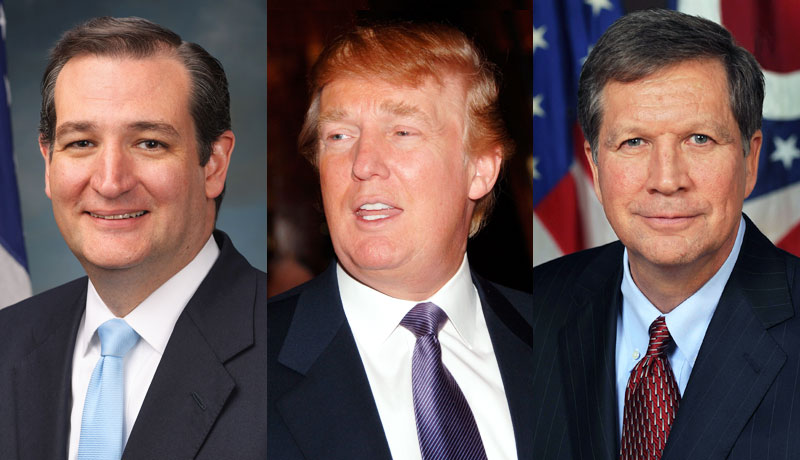
Each time the presidential primary and its candidate pool spin out of control, seemingly with no one at the wheel, the race becomes more unpredictable and potential damage stretches into years, say Cal State Fullerton political science experts.
The “What if” questions are multiplying after front-runner Donald Trump’s Tuesday sweep of three states (with one state still in play) to:
- What if there’s a contested convention?
- What if a third-party candidate enters the race?
- What if the Republican party can’t recover from the damage?
Only Ohio and Florida — two of the five — are winner-take-all delegates states. Delegates’ votes from the other three states — Illinois, Missouri and North Carolina — will be doled out proportionately, according to the candidates’ finish.
“I think anyone that says they know what’s going to happen is lying,” said Robert Robinson, assistant professor of political science.
“If Trump was someone else, anyone else, I’m convinced the others would be dropping out by now,” he said. “My gut is more worried than entertained now. I was entertained six months ago. Now I’m worried.”
Not since 1952 has the party refused to nominate the front-runner, and not since 1980 has a candidate refused to concede – forcing the contested convention. And the last winning U.S. presidential nominee produced by a brokered or contested election was Franklin D. Roosevelt in 1932.
If Trump doesn’t win a majority of the delegate votes, then the GOP party would enter the convention without a declared nominee and there could be a balloted battle on the floor of the convention for a final nominee. And if the first delegate vote – when most delegates are required to vote according to how their state voted in the primary – doesn’t declare a majority winner, all bets are off. That’s because at that point all the delegates can vote how they want.
“Normally, there are people complaining during the primaries and then they unite to support one candidate in August,” Robinson said. “But you don’t know to what extent that will happen this time.”
The most recent GOP nominee for president, Mitt Romney, campaigned for John Kasich, seeming to squash rumors that Romney might jump in the race. The rumors began after violence at recent Trump rallies mirrored images of riotous protesters during the anti-war movement. Romney and others implored Trump to condemn the violence, and Trump’s confrontational comments only seem to narrow any perceived lead over Democratic candidates Hillary Clinton and Sen. Bernie Sanders.
“I suspect there’s a lot of the party leadership that secretly hope that Trump wins the nomination and then loses, so they can work on the recovery,” Robinson said. “I’m not sure if you can put the party back together assuming Trump loses.”
Trump’s campaign has taken on a lot of the party’s policy positions. He continues to be at odds with the party platform focus set by the 2012 election, saying he’s not ready to repeal all of “Obamacare,” but that he would repeal trade legislation the Republican leadership favors, said Scott Spitzer, associate professor of political science.
“If I’m an inside party leader, chairman of the party or a former speaker of the House, I’m thinking to myself ‘this is not the only election I care about,’” Spitzer said. The party would be smart to shift its focus to holding on to the majorities in the Senate and the House, “and then they can come out with a much more effective candidate, someone who can unite their party in 2020.”
That recovery could prove costly as the party risks losing young, college-age voters turned off by infighting and lack of progress on key issues like equal pay, immigration and access to education.
Young voters are increasingly attracted to Sanders’ campaign. “He’s idealistic and speaks in simple terms about the gap between the haves and have nots,” Spitzer said.
“But students are turned off by politics because every time they turn on the TV all they see is candidates insulting and arguing with each other,” Spitzer said. “If that’s what they see, Trump becomes the new party brand and the Republican brand is irreparably harmed.”
“They feel like they can’t voice their opinion because someone might rip into them and Trump’s campaign reinforces that,” he said. “It’s just about name calling and hate. So I worry about that.”